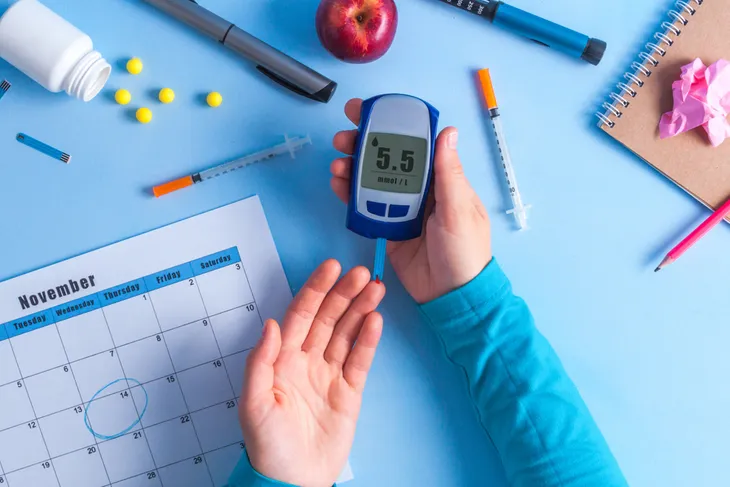Getting diagnosed with type 1 diabetes can be a traumatic event to live through. Unfortunately, the initial diagnosis is just the beginning of a life-long relationship with the disease. While getting back to normal is completely achievable, the stress that comes along with type 1 diabetes needs to be properly managed for life to resume again.
Not only does diabetes itself bring stress, but all the worries experienced before a diabetes diagnosis still exist and now can affect our bodies more intensely. Thankfully, armed with awareness and knowledge, a type 1 diabetic has the power to overcome most of the stress that diabetes will try to add to life.
Read on to learn more about how stress physically affects the body of a type 1 diabetic, tips for managing blood glucose levels during stressful times as well as overall stress management.
Want diabetes content delivered straight to your inbox? Sign up for our Diabetes newsletter and receive exclusive news and articles written from our team of diabetes experts.
How Stress Affects the Body
When the body is dealing with stress, it causes our hormones such as adrenaline and cortisol to rise. This means that the body is hormonally unbalanced and dealing with inflammation. A spike of hormones in the body inhibits our receptor cells that convert glucose to energy which causes blood glucose levels to rise.
Constant emotional or mental stress will cause a slight overall increase in blood glucose levels. Acute physical stress or emotional shock will cause a big spike in glucose levels. If not dealt with, both can have a great impact on one’s long term health.
Managing Blood Glucose Levels
It is important to keep a close eye on blood glucose levels while dealing with stress. Because it is known that stress causes an increase in glucose levels, taking the necessary steps is advised. Some diabetes management tools you may want to draw upon while living through a stressful time are:
- Testing blood glucose more often and keeping track of patterns.
- Adjusting one’s basal rate if BG remains high for longer than a day (always discuss with your doctor before adjusting your rates).
- Staying hydrated. High BG levels increase the risk of dehydration which can cause diabetic ketoacidosis, have liquids nearby at all times.
- If physical stress is expected, try administering a small amount of medication before the event (again discuss with your doctor before doing this to get help with dosing).
- Make an effort to eat nutrient-dense foods, rich in fiber and vitamins. The body will feel more balanced and blood glucose levels react the best to whole foods.
- Prioritize sleep above almost all other things. Stress + diabetes can be extremely exhausting. It’s important to give your body the rest it needs.
- Exercise if possible. When dealing with stress, it can be hard to get motivated to move, but exercise reduces stress hormones and will help get blood glucose levels back to a balanced place.
Managing Stress
Maintain a Daily Routine
It’s a good idea to have a daily routine that keeps stress managed, even when no stress is interfering in one’s life. Set aside 10 minutes a day to meditate. Be consistent with it so that it becomes a habit and well integrated into daily life. This will prepare and help tackle extra stressful days.
Keep a diabetes reflection journal on blood glucose levels and/or feelings regarding type 1 diabetes. Often times, we can be in denial of our how type 1 diabetes, it’s good to be aware of how the disease is really affecting us to we can tackle problems and live better. Also, be sure to get fresh air every day. Get outside and take a couple of deep breathes. Appreciate the day, remind yourself of something you are grateful for and do your best to live in the now.
Seek Therapy
When dealing with big problems, such as feeling stuck and unable to get out alone, do not be ashamed about seeking professional help! It is a therapist’s job to help us feel better so trust in the process that they are doing their best as well as trust in yourself that you are too.
Don’t Hide
Don’t hide your diabetes. This goes for friends, family, and work. Let people know in a causal or non-casual way (whatever works for you) that you are living with a chronic illness and it can cause some immediate health risks at times. This will reduce unwanted anxiety and stress related to future health concerns.
Living with Diabetes
As you can see, living with type 1 diabetes adds a lot of stress to ones life. As if simply managing blood glucose levels wasn’t enough of a task, every emotion and action also affects blood glucose levels.
Thankfully, we live in a time where research and development have been able to explain and help us manage diabetes better than ever. With a little bit of extra effort, nothing can get in the way of achieving one’s goals and aspirations, not even the stress of living with type 1 diabetes.









